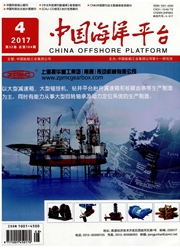

 中文摘要:
中文摘要:
<正>Formally,use of system identification techniques to estimate the forces acting on the beam may give information on hydrodynamic forces due to vortex-induced vibrations(VIVs),but no results from such attempts for submarine pipeline spans have been reported.In this study,a pipe model with a mass ratio(mass/displaced mass) of 2.62 is tested in a current tank.The gap ratios(gap to pipe diameter ratio) at the pipe ends are 2.0,4.0, 6.0 and 8.0.The response of the model is measured using optical fiber strain gauges.A modal approach linked to a finite element method is used to estimate the hydrodynamic forces from measurement.The hydrodynamic force at the dominant response frequency is the major concern,and the lift force and added mass coefficients are calculated.Response calculations are performed using force coefficients from the inverse force analysis and the calculated results are in accordance with the experimental data.
 英文摘要:
英文摘要:
Formally, use of system identification techniques to estimate the forces acting on the beam may give information on hydrodynamic forces due to vortex-induced vibrations (VIVs), but no results from such attempts for submarine pipeline spans have been reported. In this study, a pipe model with a mass ratio (mass/displaced mass) of 2.62 is tested in a current tank. The gap ratios (gap to pipe diameter ratio) at the pipe ends are 2.0, 4.0, 6.0 and 8.0. The response of the model is measured using optical fiber strain gauges. A modal approach linked to a finite element method is used to estimate the hydrodynamic forces from measurement. The hydrodynamic force at the dominant response frequency is the major concern, and the lift force and added mass coefficients are calculated. Response calculations are performed using force coefficients from the inverse force analysis and the calculated results are in accordance with the experimental data.
 同期刊论文项目
同期刊论文项目
 同项目期刊论文
同项目期刊论文
 Using a time-domian higher-order boundary element method to simulate wave and current diffraction fr
Using a time-domian higher-order boundary element method to simulate wave and current diffraction fr Identification of hydrodynamic coefficients from experiment of vortex-induced vibration of slender r
Identification of hydrodynamic coefficients from experiment of vortex-induced vibration of slender r Laboratory observations of wave evolution, modulation and blocking due to spatially varying opposing
Laboratory observations of wave evolution, modulation and blocking due to spatially varying opposing Laboratory tests of vortex-induced vibrations of a long flexible riser pipe subjected to uniform flo
Laboratory tests of vortex-induced vibrations of a long flexible riser pipe subjected to uniform flo A three-index estimator based on active thermometry and a novel monitoring system of scour under sub
A three-index estimator based on active thermometry and a novel monitoring system of scour under sub Application of Multiscale Fiber Optical Sensing Network Based on Brillouin and Fiber Bragg Grating S
Application of Multiscale Fiber Optical Sensing Network Based on Brillouin and Fiber Bragg Grating S Numerical analysis on ultimate pullout bearing capacity of drag embedment anchor based on elastic-pl
Numerical analysis on ultimate pullout bearing capacity of drag embedment anchor based on elastic-pl Scour monitoring system of subsea pipeline using distributed Brillouin optical sensors based on acti
Scour monitoring system of subsea pipeline using distributed Brillouin optical sensors based on acti 期刊信息
期刊信息
